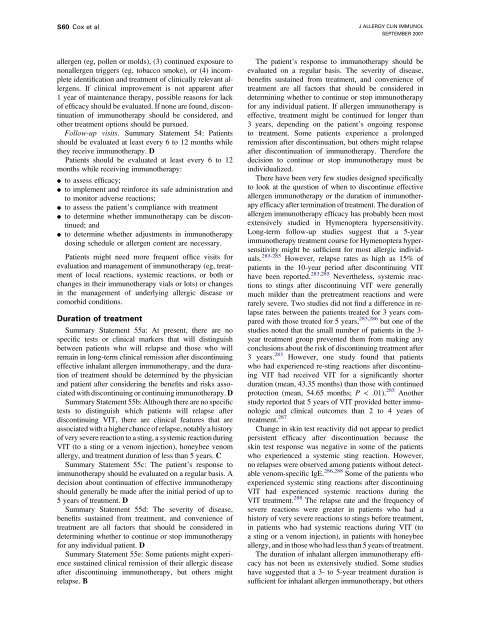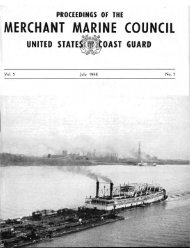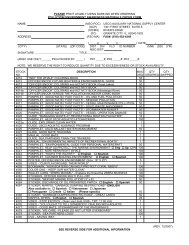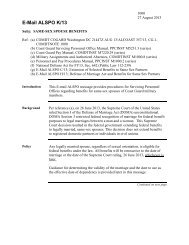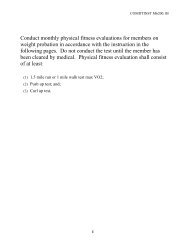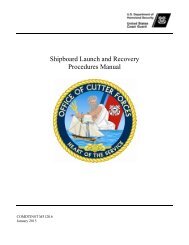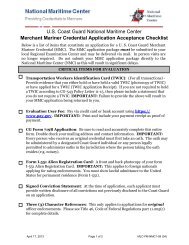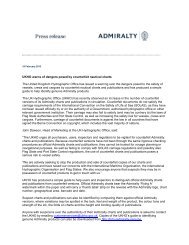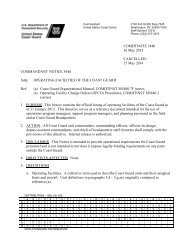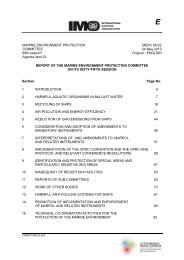Immunotherapy Safety for the Primary Care ... - U.S. Coast Guard
Immunotherapy Safety for the Primary Care ... - U.S. Coast Guard
Immunotherapy Safety for the Primary Care ... - U.S. Coast Guard
You also want an ePaper? Increase the reach of your titles
YUMPU automatically turns print PDFs into web optimized ePapers that Google loves.
S60 Cox et al<br />
J ALLERGY CLIN IMMUNOL<br />
SEPTEMBER 2007<br />
allergen (eg, pollen or molds), (3) continued exposure to<br />
nonallergen triggers (eg, tobacco smoke), or (4) incomplete<br />
identification and treatment of clinically relevant allergens.<br />
If clinical improvement is not apparent after<br />
1 year of maintenance <strong>the</strong>rapy, possible reasons <strong>for</strong> lack<br />
of efficacy should be evaluated. If none are found, discontinuation<br />
of immuno<strong>the</strong>rapy should be considered, and<br />
o<strong>the</strong>r treatment options should be pursued.<br />
Follow-up visits. Summary Statement 54: Patients<br />
should be evaluated at least every 6 to 12 months while<br />
<strong>the</strong>y receive immuno<strong>the</strong>rapy. D<br />
Patients should be evaluated at least every 6 to 12<br />
months while receiving immuno<strong>the</strong>rapy:<br />
d to assess efficacy;<br />
d to implement and rein<strong>for</strong>ce its safe administration and<br />
to monitor adverse reactions;<br />
d to assess <strong>the</strong> patient’s compliance with treatment<br />
d to determine whe<strong>the</strong>r immuno<strong>the</strong>rapy can be discontinued;<br />
and<br />
d to determine whe<strong>the</strong>r adjustments in immuno<strong>the</strong>rapy<br />
dosing schedule or allergen content are necessary.<br />
Patients might need more frequent office visits <strong>for</strong><br />
evaluation and management of immuno<strong>the</strong>rapy (eg, treatment<br />
of local reactions, systemic reactions, or both or<br />
changes in <strong>the</strong>ir immuno<strong>the</strong>rapy vials or lots) or changes<br />
in <strong>the</strong> management of underlying allergic disease or<br />
comorbid conditions.<br />
Duration of treatment<br />
Summary Statement 55a: At present, <strong>the</strong>re are no<br />
specific tests or clinical markers that will distinguish<br />
between patients who will relapse and those who will<br />
remain in long-term clinical remission after discontinuing<br />
effective inhalant allergen immuno<strong>the</strong>rapy, and <strong>the</strong> duration<br />
of treatment should be determined by <strong>the</strong> physician<br />
and patient after considering <strong>the</strong> benefits and risks associated<br />
with discontinuing or continuing immuno<strong>the</strong>rapy. D<br />
Summary Statement 55b: Although <strong>the</strong>re are no specific<br />
tests to distinguish which patients will relapse after<br />
discontinuing VIT, <strong>the</strong>re are clinical features that are<br />
associated with a higher chance of relapse, notably a history<br />
of very severe reaction to a sting, a systemic reaction during<br />
VIT (to a sting or a venom injection), honeybee venom<br />
allergy, and treatment duration of less than 5 years. C<br />
Summary Statement 55c: The patient’s response to<br />
immuno<strong>the</strong>rapy should be evaluated on a regular basis. A<br />
decision about continuation of effective immuno<strong>the</strong>rapy<br />
should generally be made after <strong>the</strong> initial period of up to<br />
5 years of treatment. D<br />
Summary Statement 55d: The severity of disease,<br />
benefits sustained from treatment, and convenience of<br />
treatment are all factors that should be considered in<br />
determining whe<strong>the</strong>r to continue or stop immuno<strong>the</strong>rapy<br />
<strong>for</strong> any individual patient. D<br />
Summary Statement 55e: Some patients might experience<br />
sustained clinical remission of <strong>the</strong>ir allergic disease<br />
after discontinuing immuno<strong>the</strong>rapy, but o<strong>the</strong>rs might<br />
relapse. B<br />
The patient’s response to immuno<strong>the</strong>rapy should be<br />
evaluated on a regular basis. The severity of disease,<br />
benefits sustained from treatment, and convenience of<br />
treatment are all factors that should be considered in<br />
determining whe<strong>the</strong>r to continue or stop immuno<strong>the</strong>rapy<br />
<strong>for</strong> any individual patient. If allergen immuno<strong>the</strong>rapy is<br />
effective, treatment might be continued <strong>for</strong> longer than<br />
3 years, depending on <strong>the</strong> patient’s ongoing response<br />
to treatment. Some patients experience a prolonged<br />
remission after discontinuation, but o<strong>the</strong>rs might relapse<br />
after discontinuation of immuno<strong>the</strong>rapy. There<strong>for</strong>e <strong>the</strong><br />
decision to continue or stop immuno<strong>the</strong>rapy must be<br />
individualized.<br />
There have been very few studies designed specifically<br />
to look at <strong>the</strong> question of when to discontinue effective<br />
allergen immuno<strong>the</strong>rapy or <strong>the</strong> duration of immuno<strong>the</strong>rapy<br />
efficacy after termination of treatment. The duration of<br />
allergen immuno<strong>the</strong>rapy efficacy has probably been most<br />
extensively studied in Hymenoptera hypersensitivity.<br />
Long-term follow-up studies suggest that a 5-year<br />
immuno<strong>the</strong>rapy treatment course <strong>for</strong> Hymenoptera hypersensitivity<br />
might be sufficient <strong>for</strong> most allergic individuals.<br />
283-285 However, relapse rates as high as 15% of<br />
patients in <strong>the</strong> 10-year period after discontinuing VIT<br />
have been reported. 283,285 Never<strong>the</strong>less, systemic reactions<br />
to stings after discontinuing VIT were generally<br />
much milder than <strong>the</strong> pretreatment reactions and were<br />
rarely severe. Two studies did not find a difference in relapse<br />
rates between <strong>the</strong> patients treated <strong>for</strong> 3 years compared<br />
with those treated <strong>for</strong> 5 years, 283,286 but one of <strong>the</strong><br />
studies noted that <strong>the</strong> small number of patients in <strong>the</strong> 3-<br />
year treatment group prevented <strong>the</strong>m from making any<br />
conclusions about <strong>the</strong> risk of discontinuing treatment after<br />
3 years. 283 However, one study found that patients<br />
who had experienced re-sting reactions after discontinuing<br />
VIT had received VIT <strong>for</strong> a significantly shorter<br />
duration (mean, 43.35 months) than those with continued<br />
protection (mean, 54.65 months; P


